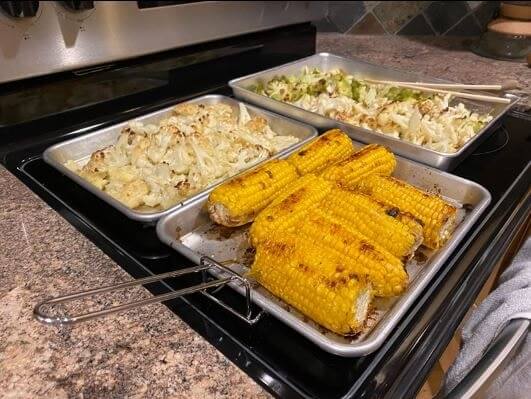When it comes to cooking appliances options, you can never go wrong with either a microwave or an oven. Visit most kitchens, and you’ll either find both or one of them.
If considering your culinary options, you need to understand the difference between the two, and in this case, a microwave and an electric oven.
The two are highly functional but have pros and cons, and choosing between them can be very confusing.
We’ve outlined their differences to help you choose the best option for your home. Keep reading.
A Table Showing the Differences Between a Microwave and an Electric Oven
| Feature | Microwave Oven | Electric Oven |
|---|---|---|
| Heat distribution | Distributes heat evenly | More even distribution of heat |
| Cooking time | Short cooking time | Long cooking time |
| Cooking large meals | Not ideal | Ideal |
| Cooking smaller food portions | Ideal | Not ideal |
| Cooking results | Great cooking results | Excellent cooking results |
| Price | Reasonably priced | Expensive |
| Use | Basic cooking | Cooking, roasting, baking, broiling, among others |
Comparing a Microwave and an Electric Oven
Heat Distribution
The main difference between a microwave and an electric oven is how they heat food. A microwave uses super-fast electromagnetic waves to vibrate the water molecules in your food. This causes friction, which makes heat warm your food.
Microwaves distribute heat more evenly, but heating may not be so even in thick and dense foods.
Electric ovens, on the other hand, work by generating heat directly. The heating coils heat up and warn the air in the oven, and the food absorbs this heat to match the air temperature.
Electric ovens boast a more even heat distribution.
Reheating
When it comes to reheating, microwaves take the crown. The fact that you’re reheating the food means that it’s already cooked through. So, you don’t have to worry about food-borne diseases or raw meat. All you need is your food to get hot fast, and microwaves can do that really quickly.
Of course, electric ovens can reheat food too. If trying to reheat an entire casserole, the oven is more efficient; the only problem is that it won’t be quick.
Cooking Large Dishes
Electric ovens are the best for cooking large meals. Actually, many microwaves can’t even fit large dishes. When it comes to large solid dishes, avoid the microwave as much as possible; otherwise, you’ll be in for a very big disappointment.
Ovens cook through without cold spots, thus the best.
Cooking Small Dishes
If you have a small family or are living solo, you’ll love cooking in a microwave. Smaller portions are very easy to cook evenly in a microwave.
On the other hand, heating an electric oven to a full temperature just to cook a single serving wastes your electricity.
Cooking Time
Microwaves take the least amount of time to heat food. It can cook your pasta or boil milk in less than 5 minutes.
It’ll take you a little more time for your food to get ready when using an oven. The only benefit is the cooking results are much better than from a microwave.
Temperature Control
With microwaves, the temperature is managed automatically. This, however, depends on the make and brand of the unit in question. There are those that allow you to change the cooking temperature manually.
It’s equally easy to control and manage the temperature in all-electric ovens.
Cooking Results
When it comes to quality cooking, a microwave can never beat an electric oven. Remember, microwaves just heat food – they do nothing else.
Ovens can do everything from toasting to roasting, grilling, baking, browning, crisping, and broiling, it can do it all. They prevent cold spots by heating your food evenly. You don’t even have to stir the food to get the best results.
Price
Both appliances come with varying price tags, but you should expect to pay more for an electric oven. These ovens (electric) are also expensive in the long run.
Microwaves are cheaper to buy and install.

Frequently Asked Questions
Q. Can I bake in an electric oven?
Yes, electric ovens are actually the most effective in terms of functionality. They use electricity for baking cakes and other desserts.
Heat is evenly distributed in an electric oven for the best baking results.
Q. Do I have to preheat an electric oven?
Yes, you need to preheat your oven before starting any recipe. Electric ovens usually take 10 – 15 minutes before they reach the proper heating temperature.
Q. For how long should I preheat the oven for pizza?
To get a crispy-bottomed crust, preheat your oven at a high temperature of 260 degrees C for at least 30 minutes.
Q. What should I not use in a microwave?
Do not use metal and Styrofoam plastic. Use microwave-safe dishes only.
Q. Is microwave cancerous?
Microwaves are not known to cause cancer. Although they use microwave radiation to heat food, it doesn’t mean that they make food radioactive.
Conclusion
Choosing between an electric oven and a microwave doesn’t have to be confusing. Both work great, and with a little research, you can get the right appliance for your home.
Note that ovens are great for your home if you have a large family that requires you to make large and quality meals from time to time.
On the other hand, Microwaves work best on small portions hence the best for singles or persons with smaller families.
And now that you know how an electric oven and a microwave compare, we believe that you’ll make the right decision.
